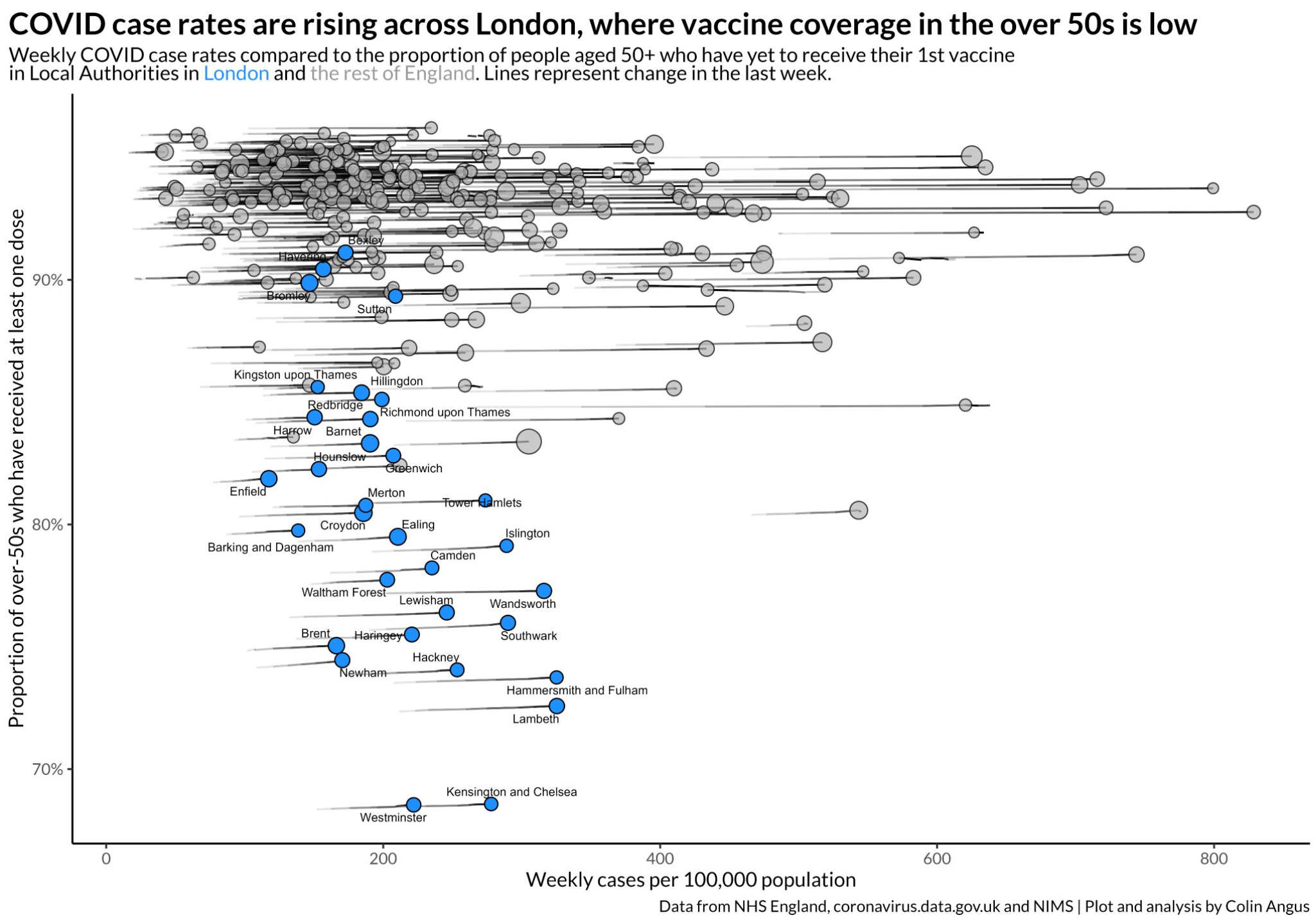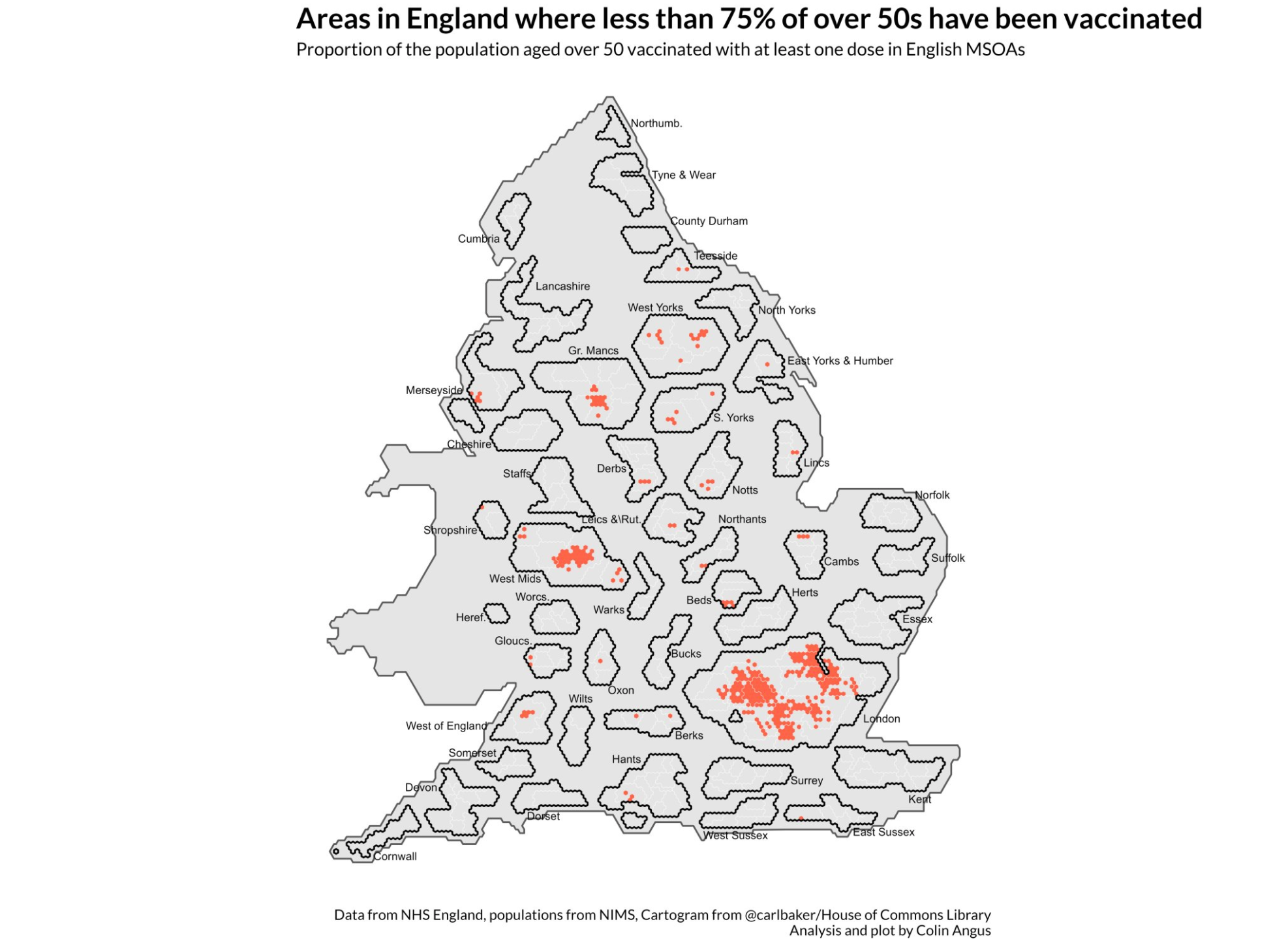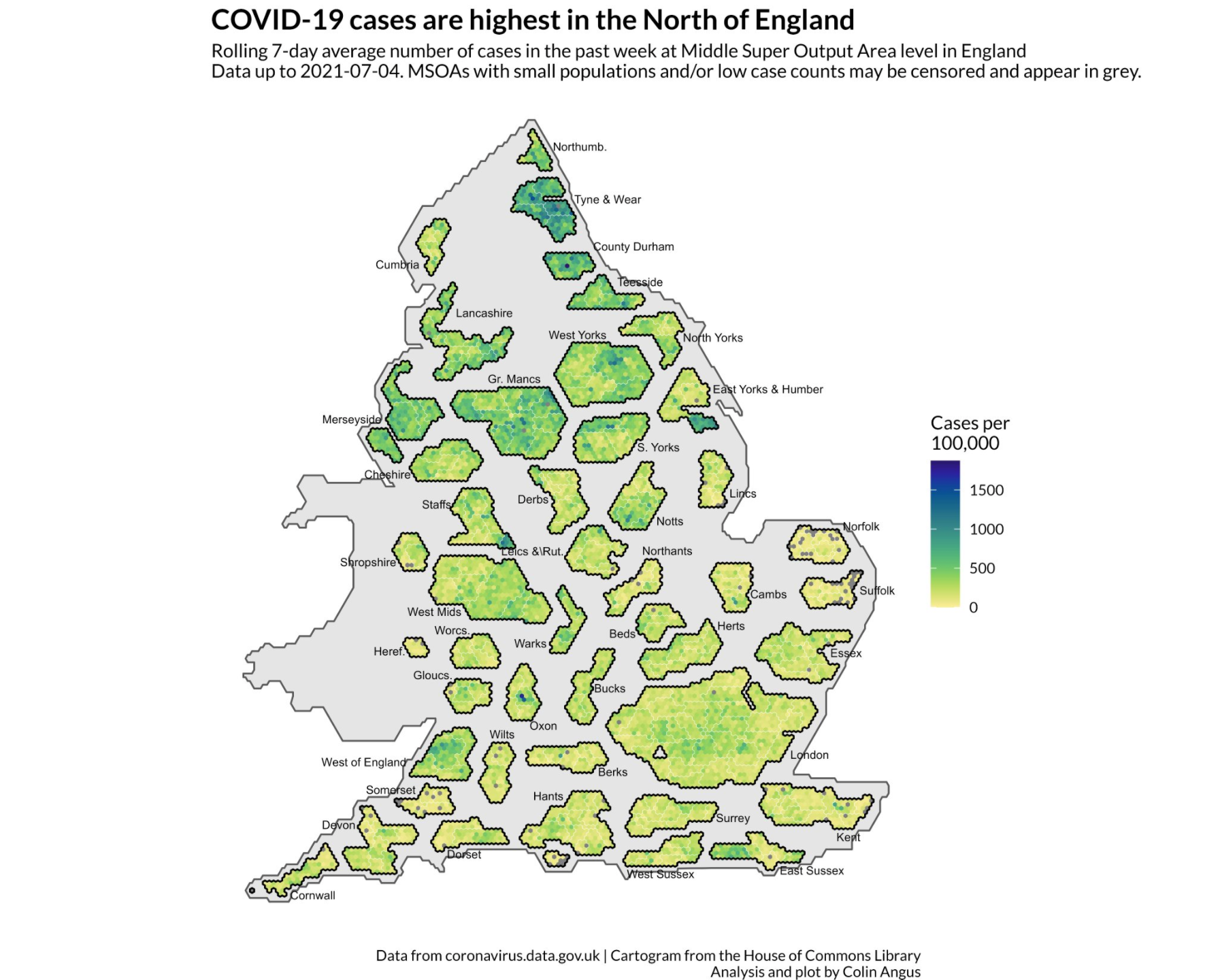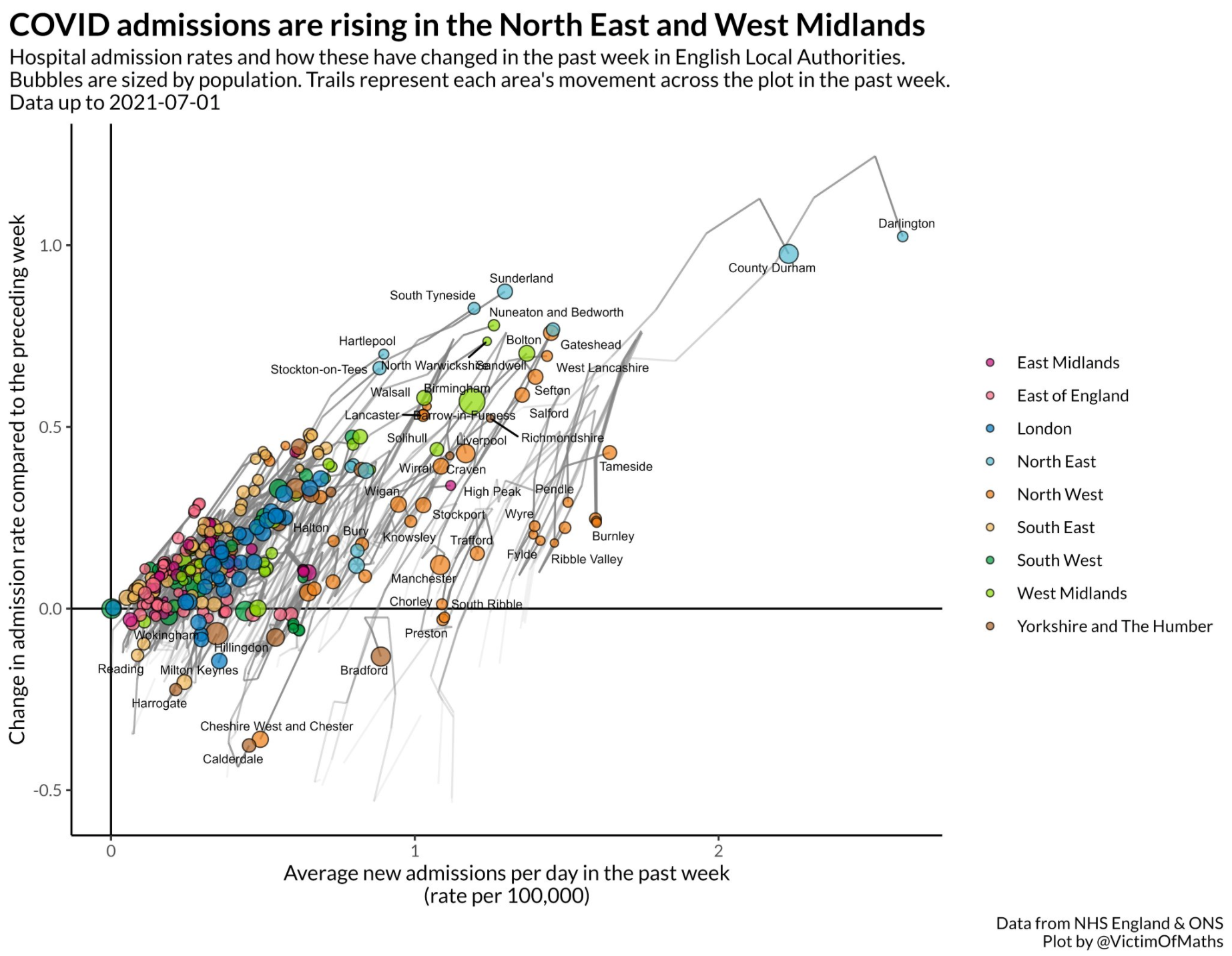Fears London could be hit hardest once Covid restrictions lifted with half a million over-50s unvaccinated
Exclusive: More than 20 per cent of over-50s in 16 out of the capital’s 33 boroughs have yet to have a single vaccine dose, modelled analysis shows. By Samuel Lovett


Fears have been raised that London could be hit hardest once all Covid restrictions are lifted on 19 July due to the high number of over-50s in the capital who have not had a Covid vaccination.
More than 20 per cent of over-50s in 16 out of the capital’s 33 boroughs have yet to have a single vaccine dose, according to modelled analysis.
Amid rising rates across the city, there are a total of 554,620 Londoners in this age group who have not been vaccinated, meaning they are not protected against the highly transmissible Delta variant.
For the rest of England, 97.3 per cent of over-50s have received at least one dose.
Evidence shows that just one jab only offers between 30 and 35 per cent protection against Delta – a figure that rises as high as 88 per cent after two shots – while those aged over 50 face a far greater risk of hospitalisation from Covid-19 compared to younger adults.
Public health directors and London mayor Sadiq Khan have all expressed concern over the capital’s flagging vaccination rates, with efforts under way to boost uptake – especially in the inner-city boroughs.
“Low vaccination rates risk leaving communities vulnerable to the virus as restrictions ease, and I’m particularly concerned about communities who have already been hit hard by Covid-19,” said Mr Khan.
“We are already seeing the big difference the vaccine is making in our fight against the virus, and we must keep pressing ahead in the vital next few days ahead of restrictions being lifted.”
Birmingham, Manchester, Liverpool and Leeds also have multiple boroughs and districts where more than 20 per cent of over-50s have yet to be vaccinated, according to analysis conducted by Colin Angus, a health inequalities modeller at the University of Sheffield.


Those individuals who have left themselves unprotected by not taking a vaccine, along with those who are not able to be vaccinated or do not generate an effective immune response due to underlying health conditions, are set to be most vulnerable when all restrictions are removed.
Although cases are highest in the North East, rates are beginning to increase across the entire country, including London.
Come 19 July, there are fears among health officials in the capital that the virus will further spread among younger, more sociable age groups before seeking out unvaccinated or partially protected over-50s, leading to severe disease, hospitalisation and rising pressure on London’s health services.
In Lambeth, cases rates are currently highest in the borough’s 20 to 29-year-old age group, at 800 infections per 100,000, and have been rising among younger people for the past six weeks, according to Dr Ruth Hutt, the council’s director of public health.
She said there has yet to be an increase among Lambeth’s vaccinated older groups; however, the borough also has one of London’s lowest coverage rates for over-50s.
Throughout Lambeth, 28 per cent of people aged 50 and over have not had a first dose. This figure is only higher in Westminster and Kensington and Chelsea, at 32 per cent respectively.
“We’ve got relatively small numbers of people going into hospital for now, but it’s clear that if you are unvaccinated you’re at a higher risk of being admitted to hospital if you have Covid,” said Dr Hutt.
She said the council was working alongside the NHS to get the message out to all communities to come forward for vaccination, particularly in those areas of high deprivation where vaccine “hesitancy” is more prevalent.
In Tower Hamlets, where 20 per cent of people aged 50 and over remain unvaccinated, director of public health Dr Somen Banerjee said he feared what lies beyond 19 July.
“The most pressing issue is that there are still 20 per cent or so who are unvaccinated in vulnerable groups,” he said. “So you’ve got older populations but also people who are clinically vulnerable who are not all vaccinated.
“If they’re in an environment where you’ve got a high level of Covid circulating, they’re at risk.”
He said the council and NHS had succeeded in raising uptake among Bangladeshis in Tower Hamlets, but that coverage rates were still flagging among the borough’s black population. A number of vaccination sites have been run from local mosques in East London, which has helped in the drive to get Muslim residents jabbed, he said.
Mr Angus said that previous waves have “shown us that London has excellent conditions for fostering the rapid spread of Covid – high population density, areas of high deprivation, lots of people in public-facing jobs”.
He said the vaccines are the “biggest weapon we have against another major wave” and a “more formidable foe in the Delta variant”, but admitted it was “real concern” that London is seeing such low uptake rates among older age groups.
He did acknowledge that the capital’s higher infection rates over the course of the pandemic meant its population may have acquired more natural immunity than the rest of the country, but said evidence suggests that vaccination provides better protection.


London’s overall vaccination rates are flagging behind the national average – though this has been credited to the city’s younger population, many of whom have only been called upon to receive a first dose in recent weeks.
Both Dr Hutt and Dr Banerjee also explained that the capital’s younger adults are more “mobile”, moving from house to house without ever properly registering with a GP, which initially made it more complicated to sort an appointment.
In response to this issue, walk-in centres have been established across London where people can get a jab without any need for ID documentation or GP registration.
More creative initiatives have also been rolled out by City Hall, such as the offer to win tickets to the Euro 2020 final if people came forward for a first dose before Thursday last week.
Ahead of 19 July, Dr Hutt said her team was doing what it can to prepare the borough for the full reopening of society, adding that the shift to “individual responsibility” was going to make it “more challenging” from a public health perspective.
“People wore seat belts because it became a legal requirement, not because it protects them in the event of an accident,” she said.
“What we need to do is make sure we're doing everything we can to protect those people who either haven’t had the opportunity because, for some reason, they can’t be vaccinated or who wont have amounted an immune response that will enable them to be protected.
“We all have a collective responsibility to keep places safe for those people so they don’t feel excluded from society more broadly.”
Join our commenting forum
Join thought-provoking conversations, follow other Independent readers and see their replies
Comments